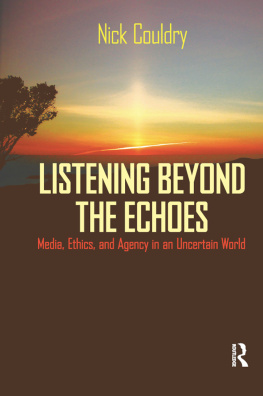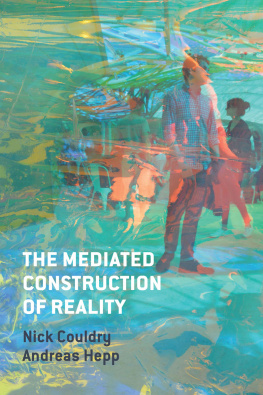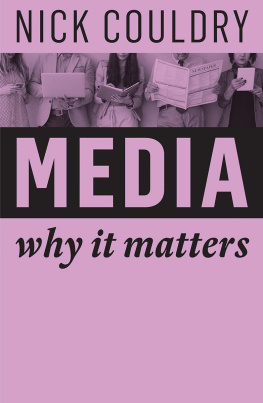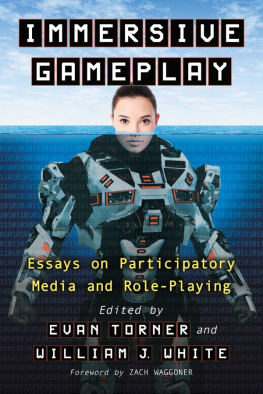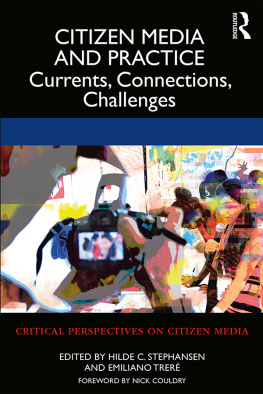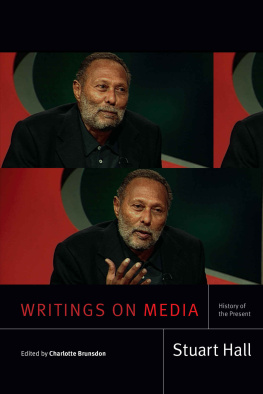
Media, Voice, Space and Power
Nick Couldry is one of the worlds leading analysts of media power and voice, and has been publishing widely for 25 years. This volume, published 20 years after The Place of Media Power, brings together a rich collection of essays from his earliest to his latest writings, some of them hard to access, plus two previously unpublished chapters.
The books 15 chapters cover a variety of themes from voice to space, from Big Data to democracy, and from art to reality television. Taken together, they give a unique insight into the range of Couldrys interests and passions. Throughout, Couldrys commitment to connecting media research to wider debates in philosophy and social theory is clear. A substantial Afterword reflects on the common themes that run throughout his work and this volume, and the particular challenges of grasping medias contribution to social order in an age of datafication. A preface by leading US media scholar Jonathan Gray sets these essays in context.
The result is an exciting and clearly written text that will interest students and researchers of media, culture and social theory across the world.
Nick Couldry is Professor of Media Communications and Social Theory at the London School of Economics. He is the author or editor of fourteen books, including The Costs of Connection (with Ulises Mejias 2019), Media: Why It Matters (2019), The Mediated Construction of Reality (with Andreas Hepp, 2016), Media Rituals: A Critical Approach (2003) and The Place of Media Power (2000).
Jonathan Gray is Hamel Family Distinguished Chair in Communication Arts at University of Wisconsin Madison, USA. He is the author of four books (Television Entertainment; Show Sold Separately: Promos, Spoilers, and Other Media Paratexts; Watching with The Simpsons: Television, Parody, and Intertextuality; and Television Studies (with Amanda D. Lotz) and the co-editor of seven further books.
Media, Voice, Space and Power
Essays of Refraction
Nick Couldry
with a preface by Jonathan Gray
First published 2020
by Routledge
2 Park Square, Milton Park, Abingdon, Oxon OX14 4RN
and by Routledge
52 Vanderbilt Avenue, New York, NY 10017
Routledge is an imprint of the Taylor & Francis Group, an informa business
2020 Nick Couldry
The right of Nick Couldry to be identified as author of this work has been asserted by him in accordance with sections 77 and 78 of the Copyright, Designs and Patents Act 1988.
All rights reserved. No part of this book may be reprinted or reproduced or utilised in any form or by any electronic, mechanical, or other means, now known or hereafter invented, including photocopying and recording, or in any information storage or retrieval system, without permission in writing from the publishers.
Trademark notice: Product or corporate names may be trademarks or registered trademarks, and are used only for identification and explanation without intent to infringe.
British Library Cataloguing-in-Publication Data
A catalogue record for this book is available from the British Library
Library of Congress Cataloging-in-Publication Data
Names: Couldry, Nick, author.
Title: Media, voice, space and power : essays in refraction / Nick Couldry.
Description: Abingdon, Oxon ; New York : Routledge, 2020. | Includes bibliographical references and index.
Identifiers: LCCN 2019035523 (print) | LCCN 2019035524 (ebook) | ISBN 9780367182052 (hardback) | ISBN 9780367182069 (paperback) | ISBN 9780429060090 (ebook)
Subjects: LCSH: Mass media and culture. | Mass mediaInfluence. | Mass mediaSocial aspects. | Mass mediaMoral and ethical aspects.
Classification: LCC P94.6 .C6875 2020 (print) | LCC P94.6 (ebook) | DDC 302.23dc23
LC record available at https://lccn.loc.gov/2019035523
LC ebook record available at https://lccn.loc.gov/2019035524
ISBN: 978-0-367-18205-2 (hbk)
ISBN: 978-0-367-18206-9 (pbk)
ISBN: 978-0-429-06009-0 (ebk)
Typeset in Bembo
by Apex CoVantage, LLC
Contents
Jonathan Gray
PART I
Speaking up and speaking out
PART II
Spaces of media, spaces of exclusion
PART III
Democracys uncertain futures
Jonathan Gray
Analysis without sorting hats
Many academics appear to have gone through, at some unspecified prior time, a ritual akin to the Sorting that occurs in the world of Harry Potter. In that ritual, newly arrived students at Hogwarts School of Witchcraft and Wizardry don the Sorting Hat, which then reads them to decide to which intramural house they should belong. So too do many academics appear to have a house assignmenta theoretical team for which they work exclusively henceforth and evermore. Nick Couldrys work is exciting precisely because he refused this ritual, working not for team/house supremacy but for better answers, and hence drawing from a broad range of intellectual traditions, theoretical schools, and scholarly disciplines.
This hat-less approach is abundantly evident in the first chapter of this collection, Speaking Up in a Public Space: The Strange Case of Rachel Whitereads House, written when Couldry was a Masters student (and thus at a point in time when many others are reaching for their Sorting Hats). Rather than lay claim to a singular Answer, and writing strongly against any such Answer being sufficient, he insists on a multi-pronged approach to understanding the titular work of art. In his charting of the various prongs Art as Text, Distinction, Media Influence and Media Events, De Certeaus Anti-Model, Public and Private Space, Local/Global, Memory, Gender, and more he announces his ambitious intent to consider complex social, cultural and aesthetic entities precisely as complex. Cultural studies, he insists in that essay, should attempt to map (even if not model) the complexity of singular events, for the search for an all-compassing model is misguided.
He is no dilettante, however, for although as is evident across the range of these collected essays hell consult anthropology, geography, sociology, literary studies, cultural studies, or philosophy, Bourdieu, Hannerz, De Certeau, Hall, Massey, Durkheim or many other disciplines or theorists when they are of use, he casts his buckets deep into their respective wells. Personally, I find this attribute refreshing and inspiring: I cannot predict the substance of Couldrys analyses, and they regularly shine not only fresh light upon a topic but encourage and open up entirely different lines of subsequent analysis. Indeed, as I will later argue, Couldrys macro sociology aims to trouble and to add ways of interpreting our cultural worlds, not to answer, simplify, and hence to subtract ways of interpreting them. This eschewing of Sorting Hats sets an interesting challenge for a reader, encouraging a similarly broad perspective and openness to various lines of inquiry, and to embracing complexity, not simplicity, in ones approach. And, for someone charged with writing a preface to a series of essays by Couldry, it sets the daunting task of denying an easy set of team/house talking points and characteristics and exploring subtler pathways. Instead, then, in what follows, I will attempt to chart some key themes and lines of questioning that I find especially fruitful and generative in Couldrys assembled essays.


